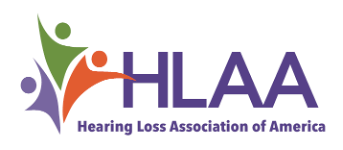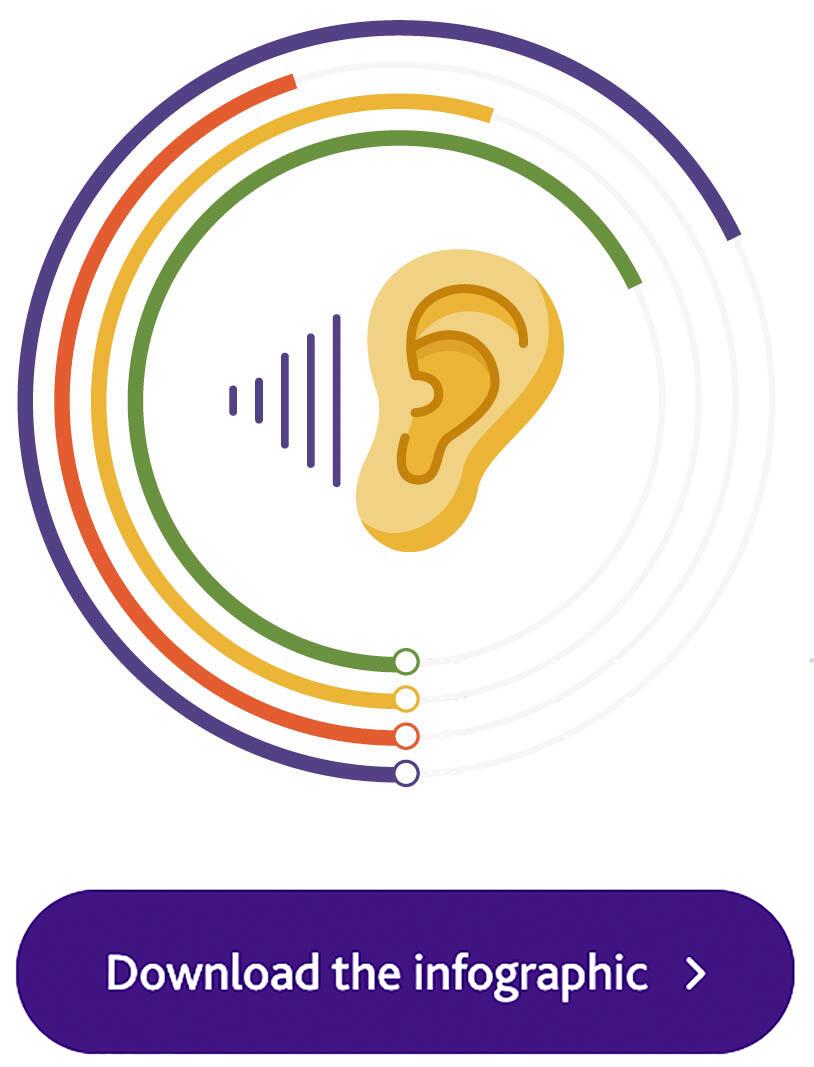Face masks inhibit communication for 95 percent of people with hearing loss, new survey finds
Media Contact
Renee Oehlerking
Cochlear Americas
303-264-2104
roehlerking@Cochlear.com
 |
 |
Face masks inhibit communication for 95 percent of people with hearing loss, new survey finds
- Hearing Loss Association of America and Cochlear survey highlights COVID-19’s impact on the community of people with hearing loss in the U.S., includes hearing and mental health-related implications
- Nearly half of those with hearing loss noticed impacts to other aspects of their health during the pandemic including increased anxiety, isolation and loneliness
- Seventy percent are more aware of their hearing loss due to the pandemic; nearly half are more eager to explore hearing loss treatment options
Rockville, Md./Lone Tree, Colo. (January 26, 2021) — Ninety-five percent of people living with hearing loss in the United States say masks and facial coverings impact their ability to communicate during the COVID-19 pandemic, which has also heightened levels of anxiety, social isolation and other mental health-related effects among nearly half of the nation’s hearing loss community.1
This is according to a new survey conducted by the Hearing Loss Association of America (HLAA), the nation's leading organization representing consumers with hearing loss, in partnership with Cochlear Limited, the global leader in implantable hearing solutions. Hearing loss is an invisible disease that affects almost 50 million Americans.2 The online survey of 1,399 participants sought to find out the pandemic’s impact on those in the hearing loss community, including individuals with hearing loss, their loved ones and their hearing health care professionals. Key findings include:
Hearing Loss and the Pandemic
- 70 percent of those with hearing loss say they are more aware of their hearing loss due to the pandemic, and 47 percent say they are more eager to explore hearing loss solutions due to the pandemic.
- 46 percent notice their hearing loss influencing other aspects of their mental health since the pandemic began, with:
- 67 percent having feelings of anxiety
- 63 percent having feelings of isolation
- 47 percent having feelings of loneliness
- 22 percent having feelings of confusion
- 21 percent having feelings of forgetfulness
- 52 percent say they feel less connected to friends and family as a result of their hearing loss during the pandemic.
Hearing Loss and Accessibility
- 95 percent of the hearing loss community say face masks/coverings have created communication barriers since the pandemic began.
- 89 percent report experiencing accessibility issues since the pandemic began (including but not limited to the ability to lipread due to face masks, physical distancing making conversations harder and not having access to captioning across all technology platforms).
- 35 percent say they have experienced a lack of empathy from others for their hearing loss during the pandemic.
“Hearing and understanding are two different things. With masks, I can hear you, but I don’t always understand you,” said Lori A. Mertes, NBCT, MEd, MAT, special education teacher and bimodal hearing recipient (a cochlear implant in one ear, and a hearing aid in the other). “Given we all may be challenged to hear with masks right now, I hope others will understand the challenges many of us in the hearing loss community face on a regular basis and now have amplified because of masks and distancing. Please slow down, speak clearly, be patient with us, and if we ask to you to repeat, please don’t say, ‘never mind.’ It’s very frustrating to be dismissed.”
Hearing Loss and Technology
- 68 percent of those with hearing loss have increased their use of technology during the pandemic to communicate with others.
- 68 percent say pandemic-related increased use of technology has caused them to become more aware of their hearing loss.
- 55 percent say their hearing loss creates challenges while using technology to communicate, while 45 percent use assistive hearing devices that make it easier to communicate.
“With the prolonged pandemic, I did not realize the mental stress and fatigue culminated over time would add to the challenges to understand with masks,” said Tim Browning, digital communication and web specialist, HLAA, and bilateral hearing aid user (a hearing aid in each ear). “I am missing the day-to-day practice of listening and talking to people in face-to-face situations. Online communications and captioning are wonderful, but to effectively hear requires continual practice hearing in all situations. When we get out of practice, it becomes harder and harder to understand with masks, so we then have to advocate for ourselves all that much more.”
“Research has long shown untreated hearing loss can negatively impact a person’s quality of life – and with masks and distancing, the impact the pandemic has had on people with hearing loss is enormous,” said Barbara Kelley, Executive Director, HLAA. “The survey results reinforce the overwhelming challenge with masks for the hearing loss community, and many requested that the larger population invest in safe, clear face masks. Additionally, the hearing loss community would like to see universal captioning provided across all technology platforms. I hope coming out of this pandemic we will see people continue to take their hearing loss seriously and treat it appropriately, as well as continue to see greater standards on accessibility to help those with hearing loss.”
Hearing Loss and Hearing Health Care
- 87 percent of hearing health care providers say they have seen increased signs of loneliness or isolation in their patients since the pandemic began.*
- 84 percent of hearing health care providers say they have noticed an increase in their patients’ awareness of their hearing loss during the pandemic, and 52 percent say they have seen an increase in their patients’ desire to explore new hearing loss solutions due to the pandemic.*
- 51 percent of those with hearing loss report their hearing health care provider offers remote care options, and 36 percent say they have used, or have thought of using, remote care options during the pandemic.
“Many individuals with hearing loss and their loved ones are now realizing how important hearing and connection is to our overall quality of life. While the pandemic has challenged our ability to hear and connect, this realization is empowering consumers to act and seek treatment for their hearing loss,” said Patricia Trautwein, MA, AuD, Vice President, Product Management & Marketing, Cochlear Americas. “We hope given the results of this survey, individuals, health care professionals and payors will focus on prioritizing hearing health and begin setting standards around protecting our hearing, monitoring hearing loss and ensuring individuals have access to and can obtain appropriate treatment for their hearing loss.”
Survey Demographics
- 85 percent of respondents are age 55 and up.
- Respondents’ gender skews female at 69 percent.
- Respondents represent 49 of 50 states, plus Puerto Rico.
- 52 percent of those with hearing loss have been diagnosed with hearing loss for over 30 years; 77 percent have hearing aids, and 32 percent have (a) cochlear implant(s).
- Of the respondents, 1,298 (93 percent) identify as individuals with hearing loss or individuals acting as a representative for someone with hearing loss, and 57 (4 percent) identify as “other,” which includes individuals who are both of the hearing loss community and a hearing health care professional, those who work as advocates for individuals with hearing loss, and other professionals whose work revolves around the hearing loss community.*
In the United States, one out of three people over the age of 65 and half of people over 75 are affected by disabling hearing loss,3 but appropriate hearing treatment and technology continues to be widely underutilized.4 Research continues to show aging adults with untreated hearing loss can be substantially affected by social isolation and loneliness with impacts to brain health and quality of life.5
If you or a loved one notice a change in hearing or suspect a hearing loss, see these resources for help:
- Do you think you have a hearing loss?
- Do you have questions about hearing assistive technology (hearing aids, implantable devices, and other hearing assistive technologies)?
- Do you have a need to explore a new hearing treatment beyond hearing aids, find a hearing specialist here.
- Find an HLAA Chapter near you for support.
About the Hearing Loss Association of America
The Hearing Loss Association of America (HLAA) is the nation’s foremost organization representing consumers with hearing loss. The mission of HLAA is to open the world of communication to people with hearing loss through information, education, support and advocacy. HLAA holds annual conventions, produces Walk4Hearing events in cities across the country, publishes Hearing Life magazine, online learning and support webinars, advocates for the rights of people with hearing loss, and has a network of chapters and state organizations across the country. hearingloss.org
About Cochlear Limited (ASX: COH)
Cochlear is the global leader in implantable hearing solutions. The company has a global workforce of more than 4,000 people and invests more than AUD$180 million each year in research and development. Products include cochlear implants, bone conduction implants and acoustic implants, which healthcare professionals use to treat a range of moderate to profound types of hearing loss. Since 1981, Cochlear has provided more than 600,000 implantable devices, helping people of all ages, in more than 180 countries, to hear.
###
References
- COVID-19 & its Impact on the HLAA Community survey. Survey of 1,399 conducted by Survey Monkey, October 10-31, 2020. Data on file.
- Hearing Loss Basics [Internet]. Hearing Loss Association of America; c2020 [cited 15 Dec 2020]. Available from: https://www.hearingloss.org/hearing-help/hearing-loss-basics/.
- Hearing Loss and Older Adults [Internet]. National Institute on Deafness and Other Communication Disorders; c2018 [cited 26 Nov 2020]. Available from: https://www.nidcd.nih.gov/health/hearing-loss-older-adults.
- Market penetration. This figure is a global estimate based on Cochlear sourced data.
- Brody, J. E. (2018, December 31). Hearing Loss Threatens Mind, Life and Limb. Available from: https://www.nytimes.com/2018/12/31/well/live/hearing-loss-threatens-mind-life-and-limb.html.
* Not statistically significant given 44 respondents (3 percent) identified as a hearing health care professional.
Please seek advice from your health professional about treatments for hearing loss. Outcomes may vary, and your health professional will advise you about the factors which could affect your outcome. Always read the instructions for use. Not all products are available in all countries. Please contact your local Cochlear representative for product information.
© Cochlear Limited 2021. All rights reserved.



